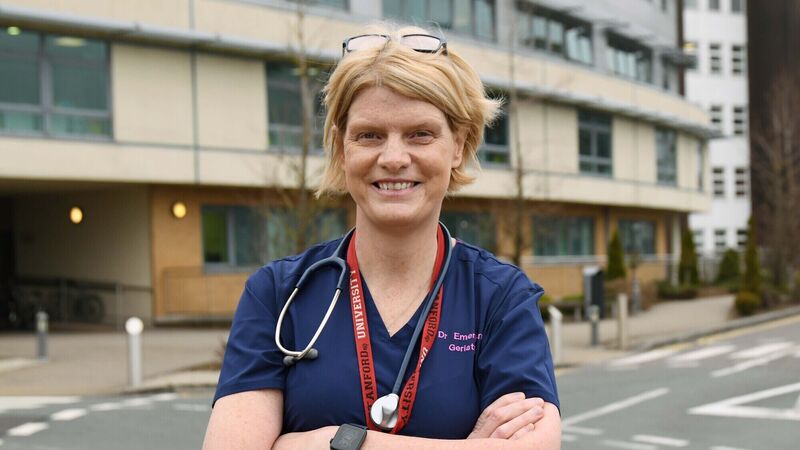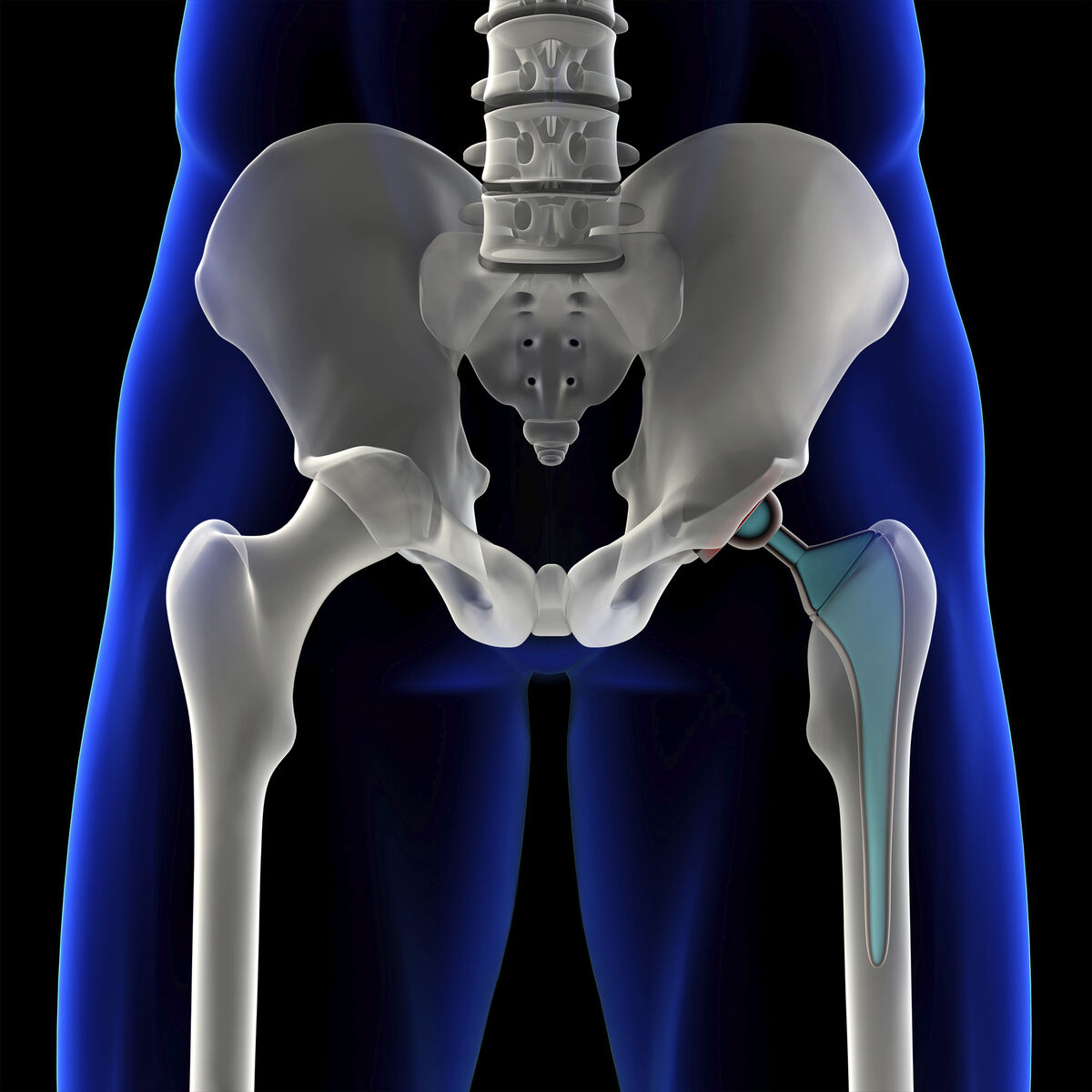40% of patients admitted with hip fractures to CUH were not operated on within 48 hours last year

Dr Emer Ahern, consultant geriatrician specialising in trauma and orthopaedic care at CUH and co-lead of the Irish Hip Fracture Database (IHFD) . Picture Denis Minihane
A REPORT, from data on patients who were hospitalised following hip fractures, has shown that, while Cork University Hospital (CUH) made improvements in some areas in 2020, in the region of 40% of patients who were admitted to the hospital with a hip fracture did not receive surgery within 48 hours of admission.
The Irish hip fracture database (IHFD) national report 2020 includes data from all 16 acute hospitals in the country on patients aged 60 years and over who were hospitalised following a hip fracture.
The report shows how hospitals around the country fared in terms of meeting Irish hip fracture standards (IHFS) — a set of standards adopted from international literature and comparable with many international hip fracture registers.
Dr Emer Ahern, consultant geriatrician specialising in trauma and orthopaedic care at CUH and co-lead of the IHFD, said that, by collecting the data, hospitals could compare the outcomes for patients between facilities, as well as between Ireland and other countries.
This also informs the evidence base to ensure patients can get the best possible care and outcomes, she said.
Hospitals report data on different standards and, while this can show areas where individual hospitals improve, it can also identify deficits. However, Dr Ahern said this could be useful.
“Oftentimes, by reporting on the processes and how things happened within the hospital, you could identify deficits which are due to lack of an infrastructure, or lack of staff and medical personnel. You actually now have the power of the data behind you to tell the story,” she said.
The audit includes seven clinical standards, the first of which relates to the percentage of patients admitted to an orthopaedic ward/theatre from the emergency department (ED) within four hours.
Nationally, 33% of patients with a hip fracture were admitted within this period, but in Cork this figure was 49% (up from 39% the previous year).

Dr Ahern said that, while there was still room for improvement, a huge amount of work had gone into achieving this.
“We still have a way to go with that, but certainly it’s great to see an improvement.
“A huge amount of work has gone in between the orthopaedic teams and the staff at the emergency department to make that happen, and the ambulance staff as well.
“They’ve been hugely helpful in terms of alerting the ED that they’re bringing in the likely hip fractures, so actually the process starts even before the patient comes into the hospital,” she said.
The second standard relates to those receiving surgery within 48 hours — 75% did so nationally, but the figure at CUH was lower, at 60% (down from 67 per cent in 2019).
“The second standard is probably the most disappointing,” said Dr Ahern.
She explained that people with a hip fracture need to be operated on early.
“That only 60% of our patients are being operated on in 48 hours is a disappointing figure,” she said.
Dr Ahern said, in part, the figure was because CUH was the busiest trauma centre in the State.
“We would see more hip fractures in Cork than any other hospital around the country and we would see more orthopaedic trauma, broken bones, than any of the hospitals around the country.
“It’s really reflecting the fact that we don’t really have the capacity to operate on all the people every day with broken bones, so there was always a waiting list, people waiting in CUH for an operation or having their operations postponed because there isn’t enough room for their operation to be done on that day,” she said.
Dr Ahern said that, while efforts were made to prioritise hip fracture patients for surgery over other fractures, this could have unintended consequences, and a person with an upper limb fracture or an ankle fracture was also then going to have their operations postponed.
At the height of the Covid-19 pandemic, patients with types of ambulatory trauma, who could have surgery on a broken bone in the morning and go home that day, were treated at the South Infirmary Victoria University Hospital to free up capacity in CUH.
“During that time, we were able to operate on the majority of them [hip fractures] within 24 hours,” Dr Ahern said.
The Cork consultant said that the orthopaedic team in CUH had proposed that they would move the ambulatory trauma off site again to improve capacity.
“At the moment, everything is just coming into the one hospital, and we prioritise on a daily basis,” she said.
The percentage of patients who developed pressure ulcers following admission was 3% nationally, and just 1% at CUH.
Cork scored 100% in the standards that a patient be seen by a geriatrician or an advanced nurse practitioner during admission, receive a bone health assessment, and receive a specialist falls assessment — an increase in each of these areas.
By comparison, the national scores were 82%, 91% and 85% respectively.
Some 78% of patients were mobilised by a physiotherapist on the day or the day after surgery nationally, compared with 72% in Cork.
The report, published by the National Office of Clinical Audit, found that, nationally, the mean length of stay for hip fracture patients was 17.1 days, a reduction of almost 2.5 days from 2019.
Some 69% of patients received a nerve block (an injection of an anaesthetic, into the hip joint, which allows the person to be pain free) pre-operatively in 2020, which is an increase of nine percentage points from 2019. The use of pre-operative nerve blocks ranged from 13% to 99% at hospital level.
CUH performed particularly well in this area, with almost all (99%) of patients receiving a nerve block pre-operatively in 2020.
“We are the best hospital in the country on this. [Almost] everybody who comes into our emergency department with a hip fracture gets a nerve block,” explained Dr Ahern.
“It allows us not to prescribe the kind of really strong kind of morphine drugs to those patients, which can cause a huge amount of side effects in older adults as well.
“It’s really a phenomenal standard to be achieving at any level. Even around the world you wouldn’t hit that level of nerve block in the ED, so that’s really a testament to our ED and anaesthetic colleagues,” she added.
The Cork consultant said that what matters most to patients when they come in with a hip fracture is getting better and going home again.
“In CUH, actually, we’ve almost halved our new admissions to nursing home care after a hip fracture, and more people are going home, directly home, from hospital than ever did before.
“That’s also happening around the country and all this data is informing that. We are, by raising the standards, raising the quality of care. We actually are doing what people want, to get better and return home again.
“So that’s the reason why we measure all these practices and all these standards because, if we actually raise the level of the quality of care that we’re giving, this translates into doing what patients want and what people want,” she said.









 App?
App?


